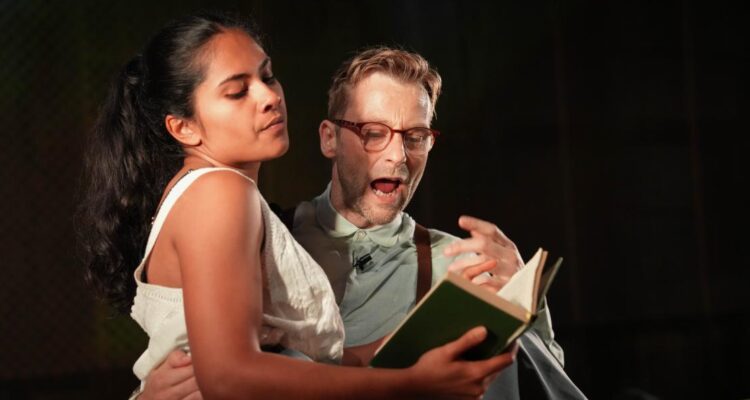Pure Expressions’ 1984 is truly an immersive experience, as its cover suggests. The production cleverly utilizes immersive elements that extend beyond the main stage and runtime, effectively detailing the classic dystopia of 1984. The cast takes significant strides to embody party members of the cultish ‘Ministry of Truth’ long before the official start of the play. Blank-faced security personnel distribute identification tags for the audience to wear, while a passionate duo performs patriotic songs on stage, and party members engage in interrogative conversations with attendees.
The premise centres on the audience participating in the final assessment to earn a place in the party, allowing interactions to continue even after the play begins in earnest. This concept is utilized to great effect, inviting the audience to engage with the nationalistic fervour and dehumanizing rhetoric that defines 1984’s Oceania. Attendees are compelled to participate in anthems, salutes, and paradoxical moral lessons, highlighting the ease and menace of the brainwashing process. The audience also moves between two locations, enhancing the dramatic impact. The interior of Hackney Town Hall convincingly serves as the ministry headquarters, with groups filing out based on their tag colours, reinforcing an orderly atmosphere. Along the way, elements like a radio broadcasting accounts of war and economic troubles provide context for the wider world of 1984. The secondary location, Hackney Town Hall Council Chamber, appears judicious and ceremonial, suggesting the ministry’s eminence and history with minimal props.
The primary location is where a tangible story unfolds within this experiential narrative. The charismatic leader of the party assessors, played brilliantly by Dominic Carter, presents ‘videos’ (performed on stage) depicting the horrors of party deviancy from his perspective. A camera continuously captures this sequence, projected onto a screen. Such effects cleverly allude to the extensive role of surveillance and narrative control in this perfect tyranny. The irony lies in the fact that the only blasphemy committed is intimacy, particularly sexual intimacy, between two people. This tutorial reveals that pleasure and organic human connection are unacceptable under this brutal regime. Any act of self-indulgence is seen as a betrayal of the party and nation, regardless of direct rebellion. Anything less than absolute devotion is a punishable offense. The play powerfully illustrates this merciless absolutism, the true defining concept of Orwell’s 1984, surpassing themes of thought-policing, media control, or mass surveillance.

The sequence culminates in an exceptionally high-stakes moment. The party quickly shatters the escapist fantasies of the romantics. They endure torture, not for information, but to break their spirit and any notion of dissent. They are subjected to torment until they accept party truths that are manifestly impossible, stripping them of rational thought in favour of irrational rhetoric. Again, immersive interactions are employed to make the audience feel complicit in these events, evoking the real choices posed by such a regime. The experience is engaging both physically and emotionally.
In conclusion, this adaptation brilliantly speculates on the same sociopolitical evils that Orwell addressed. It questions the powers and hypocrisies that allow a state to control its populace so thoroughly, as well as how vulnerable and malleable humanity can be under such a regime. This level of provocative concept and engaging narrative is a remarkable achievement, delivered in just 75 minutes
Play by Adam Taub
Directed by Jack Reardon
Set and Costume Designer: Ruth Badila
Cast includes Dominic Carter, Joe Anderson, Neetika Knight, Mark Kitto, Michael James, Zara Gabbidon, Ciara Laste, Madison Grace, Molly-Rose Treves, Jamal Renaldo
Until 22nd December
Running Time: 75 mins
Photo credit: Maggie Jupe

